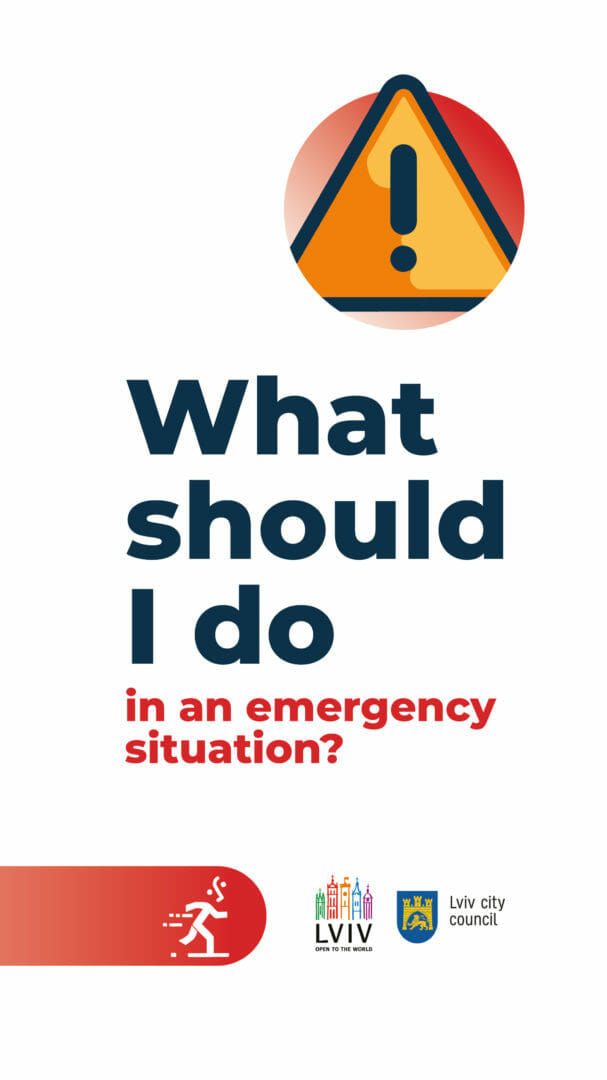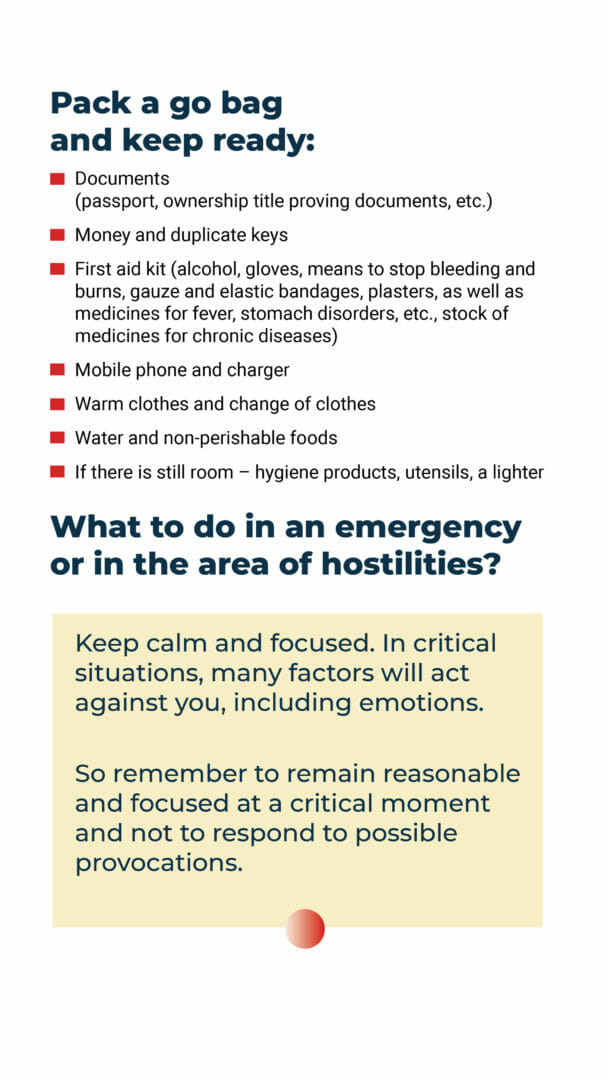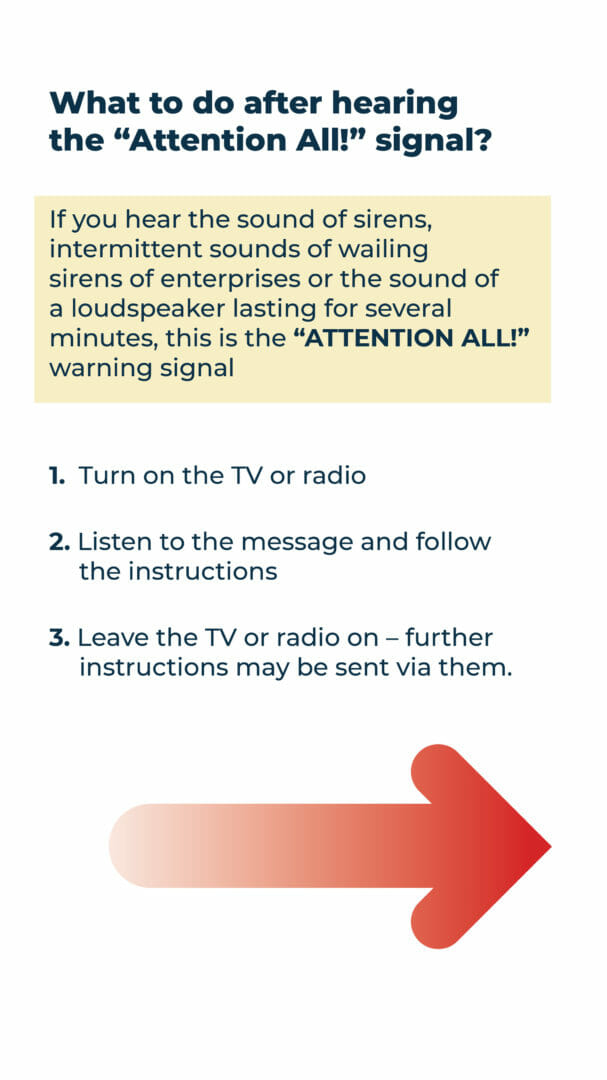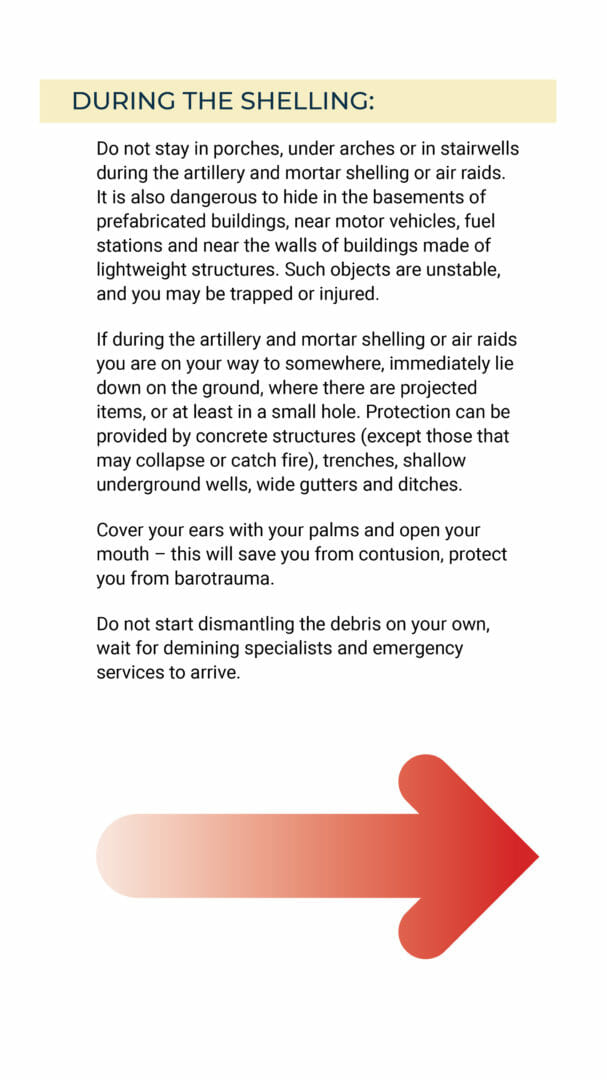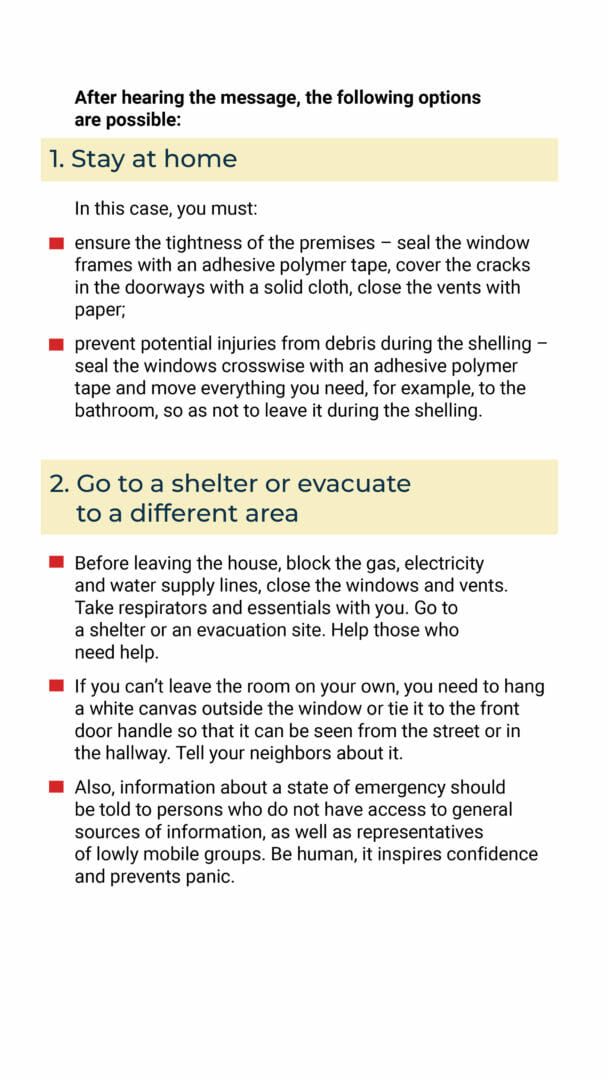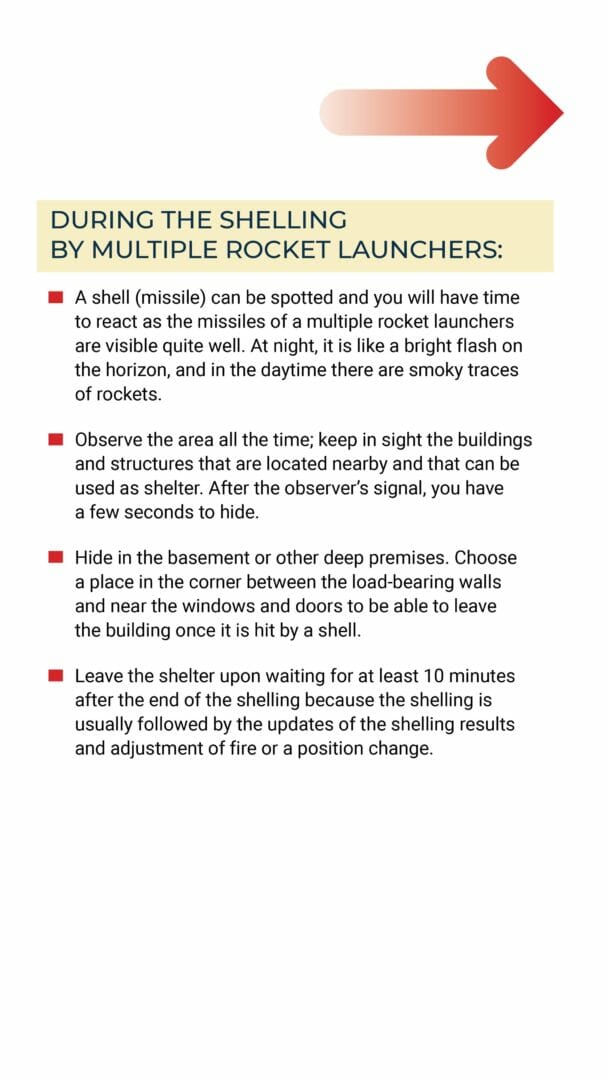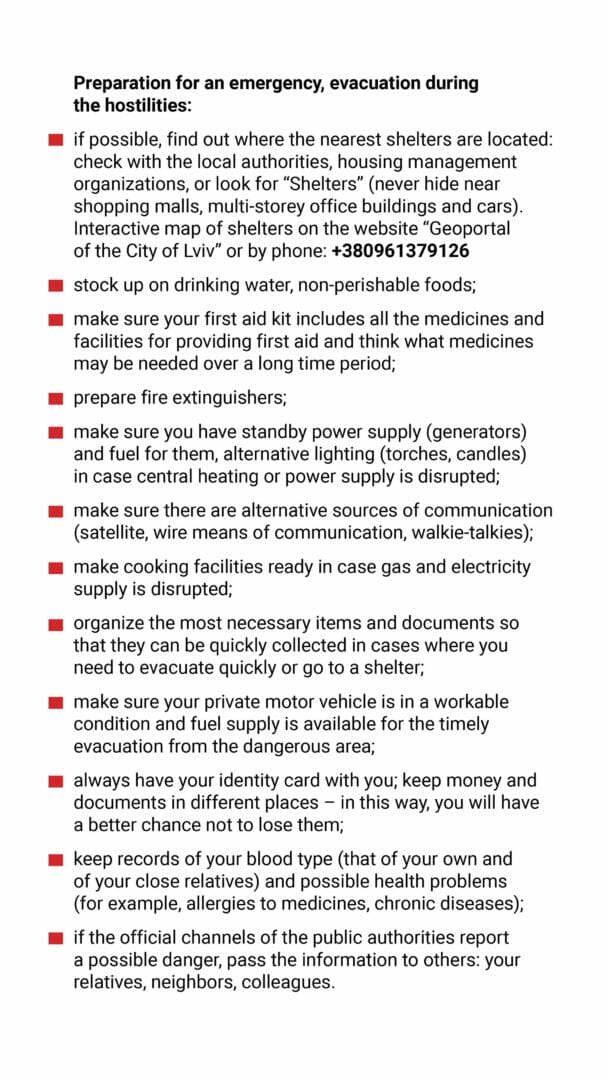Pack a go bag and keep ready:
- Documents (passport, ownership title proving documents, etc.)
- Money and duplicate keys
- First aid kit (alcohol, gloves, means to stop bleeding and burns, gauze and elastic bandages, plasters, as well as medicines for fever, stomach disorders, etc., stock of medicines for chronic diseases)
- Mobile phone and charger
- Warm clothes and change of clothes
- Water and non-perishable foods
- If there is still room – hygiene products, utensils, a lighter
What to do in an emergency or in the area of hostilities?
Keep calm and focused. In critical situations, many factors will act against you, including emotions. So remember to remain reasonable and focused at a critical moment and not to respond to possible provocations.
Preparation for an emergency, evacuation during the hostilities:
- if possible, find out where the nearest shelters are located: check with the local authorities, housing management organizations, or look for “Shelters” (never hide near shopping malls, multi-storey office buildings and cars). Interactive map of shelters on the website “Geoportal of the City of Lviv” or by phone: +380961379126
- stock up on drinking water, non-perishable foods;
- make sure your first aid kit includes all the medicines and facilities for providing first aid and think what medicines may be needed over a long time period;
- prepare fire extinguishers;
- make sure you have standby power supply (generators) and fuel for them, alternative lighting (torches, candles) in case central heating or power supply is disrupted;
- make sure there are alternative sources of communication (satellite, wire means of communication, walkie-talkies);
- make cooking facilities ready in case gas and electricity supply is disrupted;
- organize the most necessary items and documents so that they can be quickly collected in cases where you need to evacuate quickly or go to a shelter;
- make sure your private motor vehicle is in a workable condition and fuel supply is available for the timely evacuation from the dangerous area;
- always have your identity card with you; keep money and documents in different places – in this way, you will have a better chance not to lose them;
- keep records of your blood type (that of your own and of your close relatives) and possible health problems (for example, allergies to medicines, chronic diseases);
- if the official channels of the public authorities report a possible danger, pass the information to others: your relatives, neighbors, colleagues.
What to do after hearing the “Attention All!” signal?
If you hear the sound of sirens, intermittent sounds of wailing sirens of enterprises or the sound of a loudspeaker lasting for several minutes, this is the “ATTENTION ALL!” warning signal
- Turn on the TV or radio
- Listen to the message and follow the instructions
- Leave the TV or radio on – further instructions may be sent via them.
After hearing the message, the following options are possible:
- Stay at home
In this case, you must:
- ensure the tightness of the premises – seal the window frames with an adhesive polymer tape, cover the cracks in the doorways with a solid cloth, close the vents with paper;
- prevent potential injuries from debris during the shelling – seal the windows crosswise with an adhesive polymer tape and move everything you need, for example, to the bathroom, so as not to leave it during the shelling.
- Go to a shelter or evacuate to a different area
Before leaving the house, block the gas, electricity and water supply lines, close the windows and vents. Take respirators and essentials with you. Go to a shelter or an evacuation site. Help those who need help.
If you can’t leave the room on your own, you need to hang a white canvas outside the window or tie it to the front door handle so that it can be seen from the street or in the hallway. Tell your neighbors about it.
Also, information about a state of emergency should be told to persons who do not have access to general sources of information, as well as representatives of lowly mobile groups. Be human, it inspires confidence and prevents panic.
What to do in the fire zone
IF FIRE COMES FROM SMALL ARMS:
- It is best to hide in a sheltered place in case of shooting
(for example, in the bathroom or even in the bath itself). When this is not possible, you should lie down, covered with objects that can protect you from debris and bullets.
- If you are in the open in the fire zone, it is best to fall to the ground and cover your head with your hands. Effective protection can be ensured by any projected facilities, even a sidewalk, a hole in the ground or a ditch.
- A concrete rubbish bin or porch steps can also be a shelter. Don’t try to hide behind cars or kiosks as they are often targeted.
- Wherever you are, your body should be in the safest possible position. Group, lie in the position of an embryo. Turn your feet towards the source of shooting, covering your head with your hands and opening your mouth so that a close explosion does not damage your eardrums. Wait until the shooting subsides and no shooting can be heard for at least 5 minutes.
- If your home is located in an area of regular hostilities, you need to strengthen the windows (for example, with an adhesive film) – this will help prevent the scattering of broken glass. You should better close the windows, for example, with sandbags or solid furniture.
DURING THE SHELLING:
- Do not stay in porches, under arches or in stairwells during the artillery and mortar shelling or air raids. It is also dangerous to hide in the basements of prefabricated buildings, near motor vehicles, fuel stations and near the walls of buildings made of lightweight structures. Such objects are unstable, and you may be trapped or injured.
- If during the artillery and mortar shelling or air raids you are on your way to somewhere, immediately lie down on the ground, where there are projected items, or at least in a small hole. Protection can be provided by concrete structures (except those that may collapse or catch fire), trenches, shallow underground wells, wide gutters and ditches.
- Cover your ears with your palms and open your mouth – this will save you from contusion, protect you from barotrauma.
- Do not start dismantling the debris on your own, wait for demining specialists and emergency services to arrive.
DURING THE SHELLING BY MULTIPLE ROCKET LAUNCHERS:
- A shell (missile) can be spotted and you will have time to react as the missiles of a multiple rocket launchers are visible quite well. At night, it is like a bright flash on the horizon, and in the daytime there are smoky traces of rockets.
- Observe the area all the time; keep in sight the buildings and structures that are located nearby and that can be used as shelter. After the observer’s signal, you have a few seconds to hide.
- Hide in the basement or other deep premises. Choose a place in the corner between the load-bearing walls and near the windows and doors to be able to leave the building once it is hit by a shell.
- Leave the shelter upon waiting for at least 10 minutes after the end of the shelling because the shelling is usually followed by the updates of the shelling results and adjustment of fire or a position change.
Phone numbers of the emergency and rescue services
- 101 – Fire brigade
- 102 – Police
- 103 – Emergency health service
- 104 – Emergency gas service
- 1580 – City’s hotline
- +380961379126 – City’s hotline (for foreign citizens, English-speaking service)
